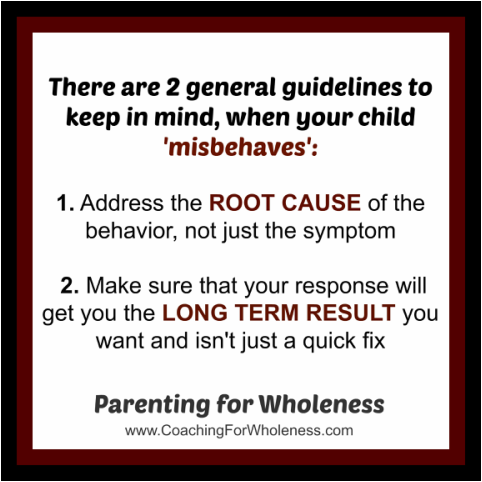 Photo courtesy of Estelle Gaffric - To make sure the US doesn't censor it, my creative daughter Gaby edited it. :-) Photo courtesy of Estelle Gaffric - To make sure the US doesn't censor it, my creative daughter Gaby edited it. :-)
So there’s one premise we need to be clear on before I divulge that tip. And it’s that our children are innately good.
I know you believe this, otherwise you wouldn’t be here. But it’s one thing to believe it intellectually, and it’s another to actually be able to parent from it, moment by moment. What I’m going to talk about here guides you to parent from that place. (For a thorough discussion on believing that our children are innately good AND cooperative, request my report The Almost Magical Formula for Surprising Ease and Harmony in Your Family While Fully Honoring Your Children’s Spirits. It’s the first element of the formula.) The thing is that once you truly know that your child’s nature is good, know it in your bones, when she ‘misbehaves,’ it will be obvious that it comes from a place of something being ‘off.’ So grounded in this knowing, the question you’ll ask yourself is: "WHY is he behaving this way?" Not in a "Why in the hell is he doing this?" way, but with genuine curiosity, wanting to really understand what’s going on inside your beloved child. And then you’ll be able to address THAT. The REAL cause of the ‘misbehavior’ or the situation. You’ll be able to address the underlying issue instead of just controlling the behavior. Like healing the actual cause of an illness instead of just taking a pill to mask the symptoms. You’re going to understand that there’s a valid reason she's acting that way and you’ll start the detective work to uncover it. Here are 10 questions you can ask yourself to help you figure out WHY your child is acting the way he is: ✔ What information does he need to shift his behavior of his own choice? “Oh honey, if you pick those flowers we won’t have them to keep our yard beautiful anymore.” “When you pull on the dog’s tail, it hurts him, just like it would hurt you if I was pulling on your ear.” ✔ Are my expectations of him realistic in this situation? Are you expecting an 18 month old to want to sit on a chair for 30 minutes while having dinner, when his whole drive at that age is towards motor development? Are you expecting a 4 year old to let you talk uninterrupted when he doesn’t have something engrossing to do or hasn’t had much connection time with you recently? ✔ Does she have a need that’s not being met and needs to be attended to? Is she tired or hungry, and in need of food or sleep, in order to no longer feel depleted and be able to cope with life? Has he been cooped up in an apartment for two days and is in dire need of open spaces and loud running around? Does he have food sensitivities yet has been eating triggering foods? ✔ Does he have an emotion or experience that needs to be processed? Did he throw down his cup because he’s feeling frustrated? Did he yell at you because he’s feeling overwhelmed by all he has to do to get ready for school? Is she acting out because she feels displaced by his new sibling? ✔ Is he responding to the way people around him are acting or feeling? Have you been feeling rushed and barking out directions at him instead of connecting with him while making your requests? Have you and your spouse been arguing and he’s feeling uncomfortable? Have you been especially busy and preoccupied recently? ✔ How can I respond so he truly FEELS that I'm on his team and not an adversary out to talk him out of what he wants or feels? Using a kind voice and helping him come up with a positive way to deal with the situations are examples of responses that will make him feel that you’re on his team. ✔ How can I state what's appropriate in this situation while honoring his feelings and needs? “I know you get really angry when your little sister breaks your Lego project, but you need to tell her with your words that you’re angry, not by hitting her.” “I know it’s really hard not to pick those pretty flowers. We can pick some of those pretty leaves if you want, or we can go throw the basketball together." ✔ Am I willing to set a clear limit and find a way to positively and consistently enforce it so he takes me seriously in the future? For children (especially young children) to learn what they can and can’t do, it needs to be clear and consistently enforced. Generally if you let them do something one time, or occasionally when you’re too tired to enforce the limit and help them find something else to do, they’ll keep doing it. And they'll learn not to believe what you tell them.
(For a convenient CHECKLIST of those questions, which you can post on your fridge for easy access when you really need them, click the button below.) So there are really two general guidelines that I recommend you always keep in mind, when your child ‘misbehaves’: 1. Address the cause of the behavior instead of the symptom, otherwise you’re really not resolving anything. 2. Make sure that your response will get you the long term result you want and isn’t just a convenient quick fix which will end up backfiring in the long run. WANNA GIVE BACK? Did you get value from this article? If so I would be incredibly grateful if you could share this article with your friends on Facebook (below) or Pinterest. I would LOVE help spreading the word about my work to people who could be positively impacted by it! FOR HELP ON PARENTING from a place of knowing that you're children are innately good, request my FREE report: The Almost Magical Formula for surprising EASE and HARMONY in your family while fully honoring your children’s spirits.
4 Comments
Theresa
1/1/2016 09:35:10 pm
I love this article so muc, it speaks directly to me, my family and the struggles we have had trying to be a better guide to our son. Thank you!
Reply
Eliane
1/1/2016 09:42:04 pm
I'm so glad you enjoyed it, Theresa! Thank you for taking the time to tell me. <3
Reply
Barbara
8/28/2016 04:35:56 pm
Reply
Hannah
12/4/2017 09:42:08 am
Very nice.
Reply
Leave a Reply. |
PARENTING FOR WHOLENESS
HOME BLOG PROGRAMS CLEAN PARENTING™ PROGRAM QUICK START PROGRAM CONTINUUM CONCEPT WHAT IS CLEAN PARENTING™? © 2021 PARENTING FOR WHOLENESS |
|



